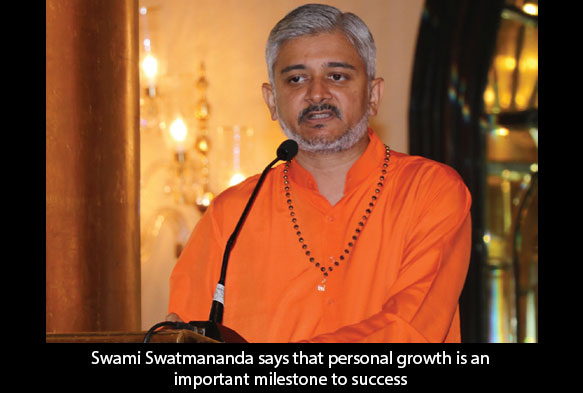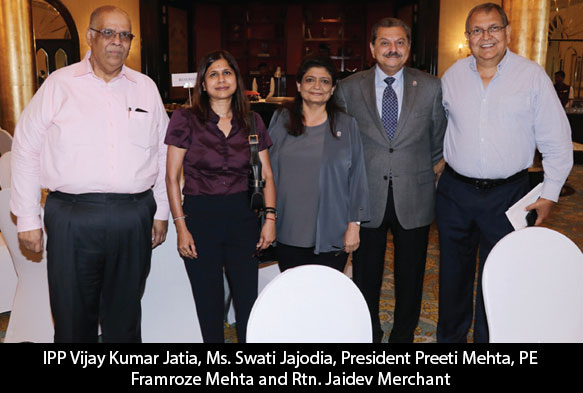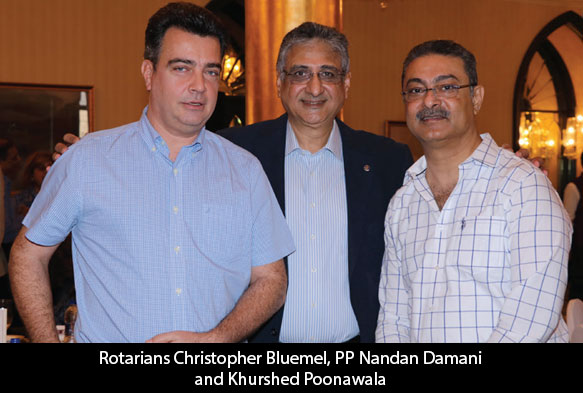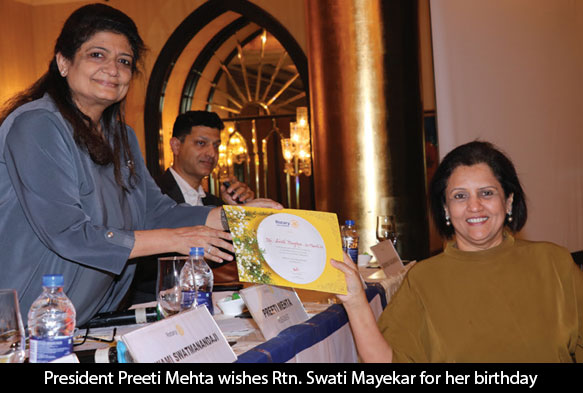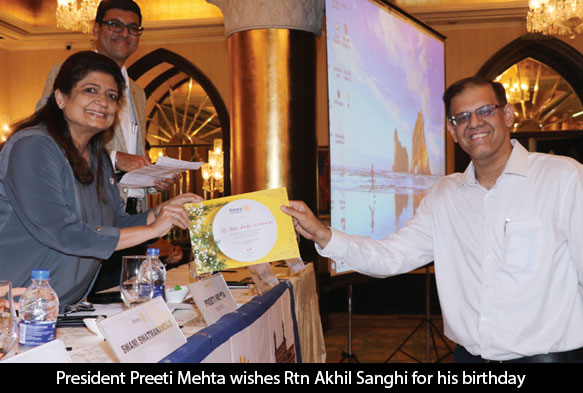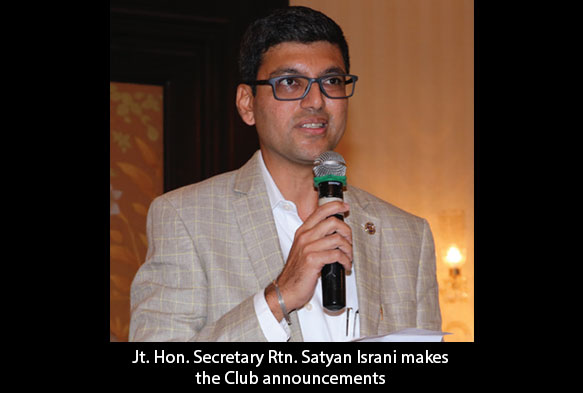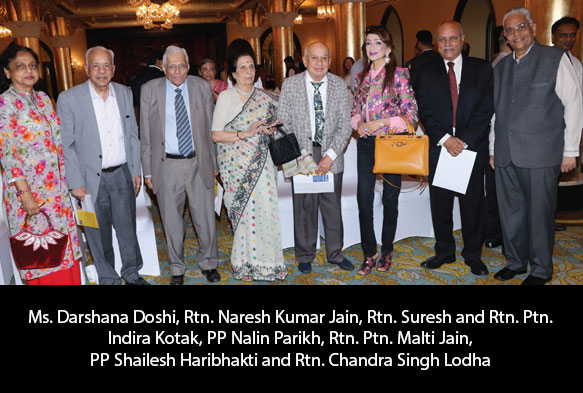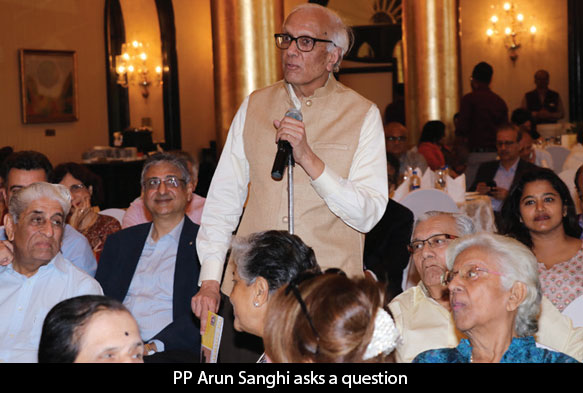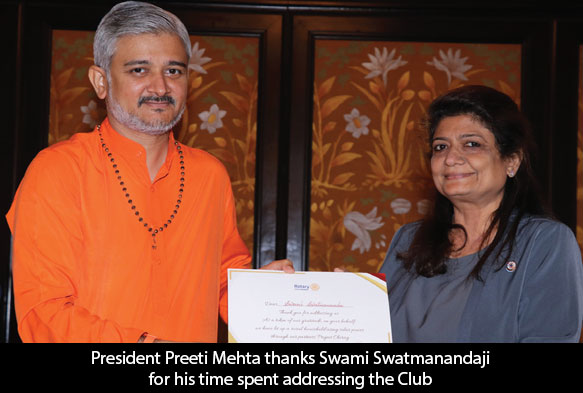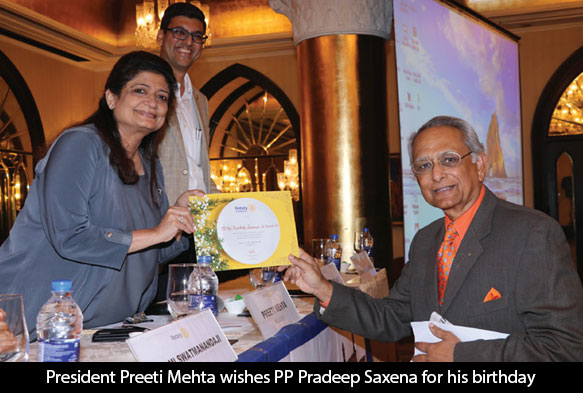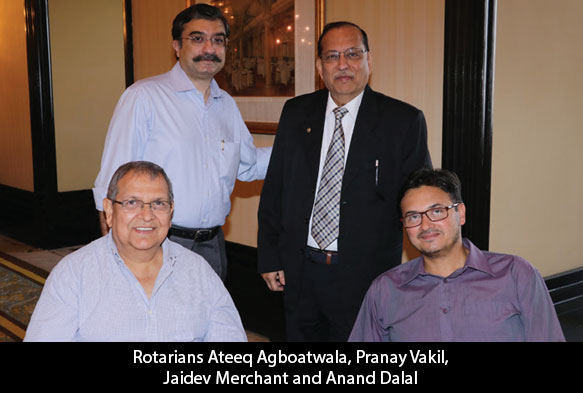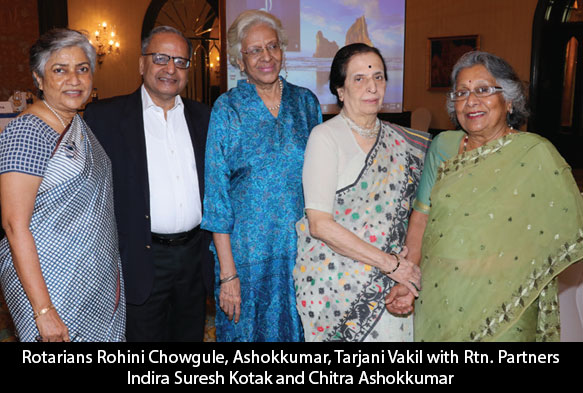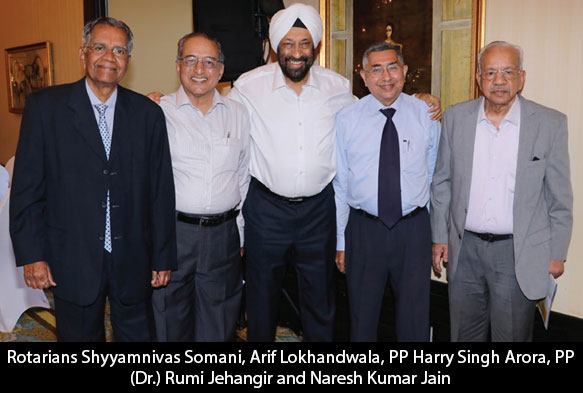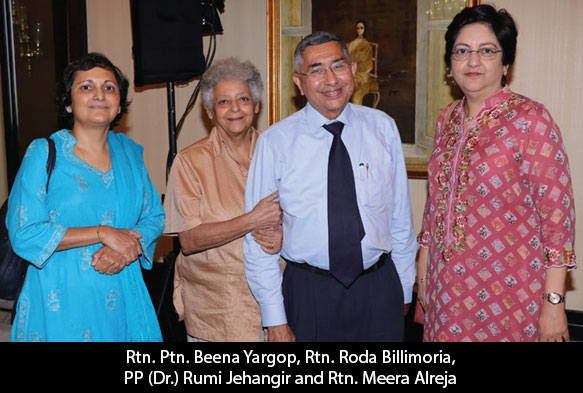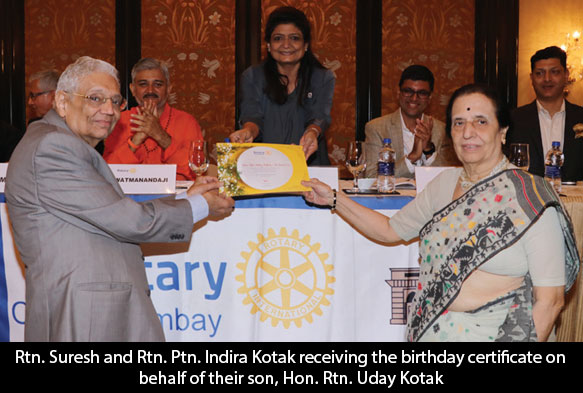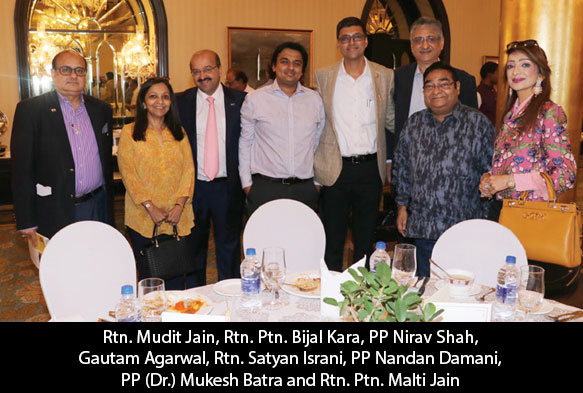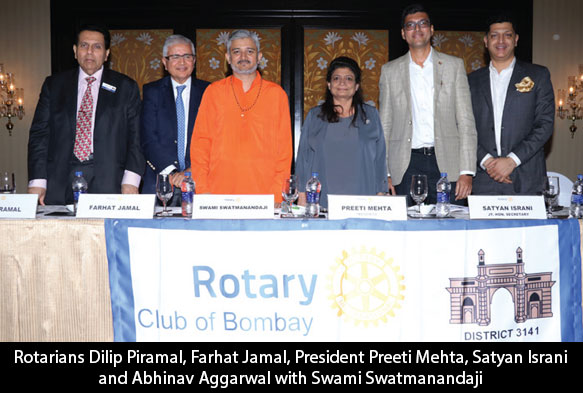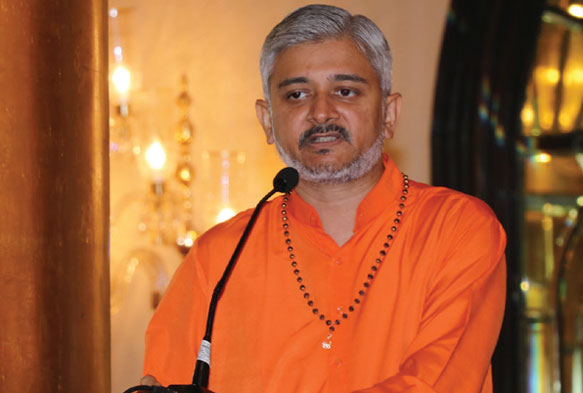
Swami Swatmananda, Head of Chinmaya Mission, Mumbai, redefines success for Rotarians
 As my teacher Swami Chinmayanand says, ‘Success is a tribute that life pays to excellence’. When we cultivate an excellence of mind, then success is a natural offshoot. And, so, everybody desires success. Each one aspires to be successful; many become so because success makes us feel good about ourselves, gives a sense of accomplishment and makes us feel happy. So while success is an important part of life, how we define success is also an important connotation. If we say that achieving the goal is success, then no doubt it is a part of success; but our culture also says – very beautifully – that the means we adopt to gain success are as important as the goal.
As my teacher Swami Chinmayanand says, ‘Success is a tribute that life pays to excellence’. When we cultivate an excellence of mind, then success is a natural offshoot. And, so, everybody desires success. Each one aspires to be successful; many become so because success makes us feel good about ourselves, gives a sense of accomplishment and makes us feel happy. So while success is an important part of life, how we define success is also an important connotation. If we say that achieving the goal is success, then no doubt it is a part of success; but our culture also says – very beautifully – that the means we adopt to gain success are as important as the goal.
In Ramayana there is a very simple incident where Ravan kidnaps Sitaji and while he is taking Sitaji, Jatayu fights with him and tries to save her. He is valiant but is deeply injured and falls down. In a sense, it could be said that Ravan was successful in kidnapping Sitaji and Jatayu failed. But Jatayu gets liberated and Ravan is eventually killed. The means are thus as important as the goals. In all our scriptures, this was illustrated very well.
Along with the achievement of the goal, how much one has grown is an important aspect of success. So, it is not enough to have more and more in life, it is important to grow higher in life. From a spiritual standpoint, that is what redefining success means.
Take the acronym HIGHER.
H – Highest Vision; what will bring out one’s potential to the fullest and make a difference to society. What is it that is going to help one to manifest one’s potential and how does it benefit one in a positive way. Dr. Kalam said, ‘A small aim is a crime. When we think small, we become small. When we think big, our potentials manifest.’ This thinking, whether big or small, is not just in terms of targets, it is in terms of how selfless one has been that one is able to make a difference to the people around. Such a person is called ‘Parth’. In Gita, one name of Arjun is Parth – one who aspires for the highest.
When an ordinary person finds an inspiring idol in life, the extraordinary potential manifests from that person. Narendra was an ordinary college-going youngster, but the mighty Vivekananda was born out of him when he found the ideal that he wanted to empower other people with the knowledge of Vedanta. Jamshedji Tata transformed the Indian industry, and we are here in this Taj Hotel because he had the vision for his country. Anyone who is able to find such an altar of dedication where they become insignificant and the cause becomes supreme, that person achieves
success as well as makes a big difference.
I – Integration; body, mind and intellect – there are three aspects of personality. To achieve the highest version that in one’s personal life as well as in the society, one has to learn to act in integration. Generally, when one is sitting or doing some work, the body is in one place, the mind is somewhere else and the intellect is thinking something else. So, the personality is scattered. Yog means to unite the body, mind and intellect. One of the best ways to do this is to do what Swami Chinmayananda used to say: bring your mind where your hands are which, today, we know as mindfulness. So, mindful eating, mindful talking, mindful walking, etc. Today, there is a lot of research that shows that multitasking is a myth that dissipates a lot of one’s energy, one’s error rate goes up, one’s enjoyment goes down and one spends much more time. So, doing one thing at a time is an important aspect of integrating one’s body, mind and intellect. One of the criteria of success is integration; with it, the goal of life can be experienced in every moment. Right here and now my mind is fully in the present, I experience peace and happiness here and now. Such a mind can meditate beautifully and that mind also discovers supreme peace within one’s self.
G – Great fortitude; higher the goal, greater the obstacles. True success is in the ability to not give up and strive continuously towards whatever goal one has in spite of the obstacles that may arise, the single pointed effort that one wants to achieve without giving up hope. I will achieve what I want to achieve. Objective or subjective, there will be a lot of challenges that will have to be overcome. Negative approach, being pessimistic or giving up hope never serve anybody. Even in the most difficult situation, the one who is positive and equanimous is wise and successful. Kalidas said, in a Sanskrit verse, that whose mind does not get disturbed even in the most provocative time, that person is a wise person. It is true success when one is able to cultivate equanimity of time. One is able to have fortitude and retain one’s inspiration of achieving the goal.
H – Happy team; how does one build good teams because one has to work with people. The biggest challenge in team- building is personal attachment and ego. Why are people not able to work with each other harmoniously? Because, ego comes out and spoils everything. How one keeps one’s ego aside and works harmoniously in a team that shows true success. One may achieve success but if there is no one with you, if there is no team, one is not able to live harmoniously with people around one’s self, then what use is that success? I read, somewhere, your success is determined by the smiles on the people around you. Are the people around you happy? Are the teams that you built happy? Are they inspired? Do they feel loved? We do a lot of corporate programmes.
Swami Chinmayanand was the earliest to bring Vedanta in the corporate world. One of the topics we address, many times, and which becomes a challenge also, they always say that Swamiji please come and motivate and teach us how to work together as a team and stay together as a team.
In this, the one point that comes up is: treat employees as humans. It is such a simple point but that point often takes precedence because people are not people; they treated as a means to achieve goals. So, success truly is how I treat people around me and work together. In our culture it is symbolised by Yagya, this is not just a ritual – it is a cooperative effort where everybody brings their best, somebody brings firewood, somebody brings flowers, somebody brings ghee. Everyone performs the act for a common goal, sinking their differences because the goal is important. If my country is important to me, I will keep aside all differences and work together for the growth of my country. Like, polio eradication by the Rotary Club of Bombay – everyone comes together because the cause is important, keeping aside their differences. That is success.
E – Efficiency; to achieve what we want. There should not be lethargy, procrastination. Whatever I know I should be able to implement. It is the capability to bring proficiency into experiment. What I know I am able to apply. How do we cultivate this ability? It comes when I consciously remove all those barriers to my being dynamic and active, and which is my comfort zone. Success is how much I am able to break away from my comfort zone, challenge myself. It could be sleep, enjoyment, habits like browsing on the net or phone, efficiency is identifying all my comfort zones which are not allowing me to give my best and eliminating them.
R – Result Acceptance; success is not just achieving the result, success is also to accept the result as it comes, positive or negative. Often, positive results make us feel happy but when the result is not up to the mark, one feels devastated. India is one of the youngest countries of the world yet it is one of the depression and suicide capitals of the world. So many youngsters are attempting suicide. Why? Because sometimes the pressure of performing is so much, lack of acceptance of results. How do I learn to accept the results as they come? When I understand that my actions govern life, not just results. In the Gita we say, Yogah Karmasu Kaushalam, yogah is the efficiency in action. Do the best, leave the rest. Whatever result comes, let me learn to accept with humility, gratitude and cheerfulness and if I have to introspect, I should be able to do that so that next time I will be better. But non acceptance of the result brings agitation and pessimism. So while I may feel disappointed I should know how to bounce back.
According to research, when people become successful their brains are used much less, compared to those who failed because when a person fails, a person starts thinking where did I go wrong and what should I do better, how do I improve in future. Hence it is very important not only to aspire for success but to learn to handle failure and
maintain balance.
These are the few beautiful aspects of success that whatever we have is a gift from the lord, what we do with what we have is our gift to the lord. And, hence, if each of us able to truly understand success not in terms of goals that we want to achieve but in terms of life itself that the more and more we aspire to live the higher way of life, the more and more we will be happy, successful, make a big difference to the society and when we drop the body, there is no regret but only fulfilment that I have done great and lived a happy life, I have made a difference to society and I lived happily.
So how we experience fulfillment which in Vedanta we call as moksha, the true success of life is to experience that fulfilment, where there is not thirst to become something more, there is no sense of incompleteness, the question of what next has been dissolved because one has experienced that inner bliss.
Duniya mein kamaaye kya
Heere kya Moti,
Duniya mein kamaaye kya
Heere kya Moti,
Yaaron ye yaad rahe ki Kafan
mein Jeb nahin Hoti.
Woh bhi Gaye Khali hath Jo
Mulkon ke waali the,
Sikandar gaya jahan se tab
dono haath khali the.

